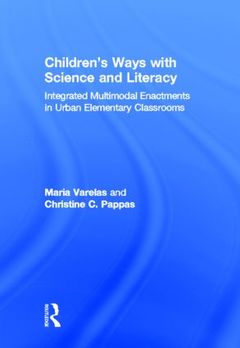Description
Children's Ways with Science and Literacy
Integrated Multimodal Enactments in Urban Elementary Classrooms
Coordinators: Varelas Maria, Pappas Christine C.
Language: English
Subjects for Children's Ways with Science and Literacy:
Keywords
forest; unit; matter; maria; varela; curriculum; genres; urban; elementary; classrooms; Urban Elementary Classrooms; Forest Unit; Matter Unit; Integrated Science Literacy; Posttest Answer; Curriculum Genre; Children’s Literature Book; Graduated Cylinders; Text Picture Relationships; Home Projects; Wet Paper Towels; Evaporation Experiment; Intertextual Connections; Forest Entities; Can; Children’s Information Books; Macroscopic Property; Science Ideas; Dramatic Enactments; Information Books; Jennifer’s Class; Developing Knowledge; Shaving Cream; Science Informational Texts; Forest Books
Support: Print on demand
Description
/li>Contents
/li>Biography
/li>
Science is often a forgotten subject in early elementary grades as various mandates require teachers to focus on teaching young students to achieve specific reading and mathematical competencies. This book offers specific examples and empirical evidence of how integrated science-literacy curriculum and teaching in urban primary-grade classrooms give students opportunities to learn science and to develop positive images of themselves as scientists.
The Integrated Science-Literacy Enactments (ISLE) approach builds on multimodal, multidimensional, and dialogically oriented teaching and learning principles. Readers see how, as children engage with texts, material objects, dialogue, ideas, and symbols in their classroom community, they are helped to bridge their own understandings and ways with words and images with those of science. In doing so, they become learners of both science and literacy. The book features both researcher and teacher perspectives. It explores science learning and its intersection with literacy development in schools that educate predominately children of color, many of whom struggle with poverty and have been traditionally underestimated, underserved, and underrated in science classrooms. In all these ways, this volume is a significant contribution to a critically under-researched area of science education.
Preface
SECTION I
1. Integrating Science and Literacy: Forms and Functions
SECTION II
2. Read-Alouds of Children’s Literature Information Books: Dialogic Sharing and Intertextuality
3. Children’s Language Acts: Diverse Forms of Classroom Participation in Read-Alouds
4. Hands-On explorations that Nurture Scientific Practices: Linking Doing with Thinking and Talking
5. Book Writing and Illustrating: Ways with Text and Pictures
6. Dramatizing as a Tool for Thinking and Speech
7. Scientific Practices in Home Projects: Exploring at Home, Sharing at School
SECTION III
8. Learning Together Over Time: Young Children Making Meaning
9. Children’s Conceptions of Being Scientists
SECTION IV
10. Young Children in Urban Classrooms: Possibilities for Sciencing
Maria Varelas is Professor of Science Education, Department of Curriculum and Instruction, University of Illinois at Chicago.
Christine C. Pappas is Professor Emerita of Literacy and Language Education, Department of Curriculum and Instruction, University of Illinois at Chicago.




